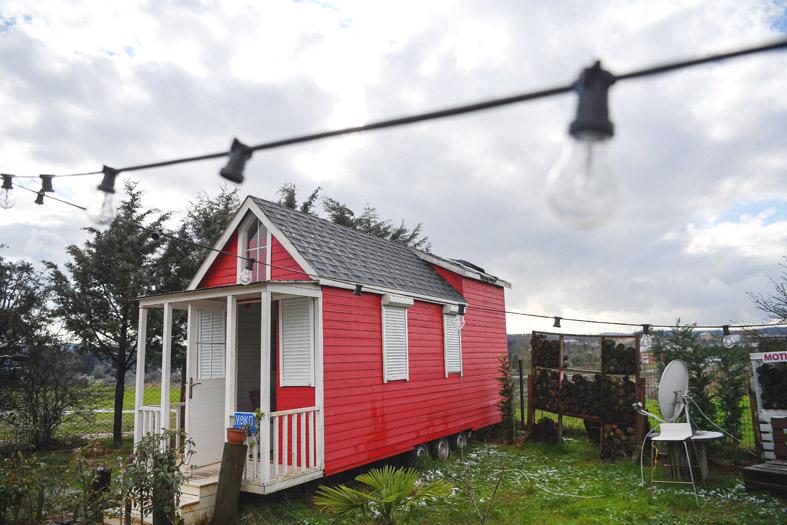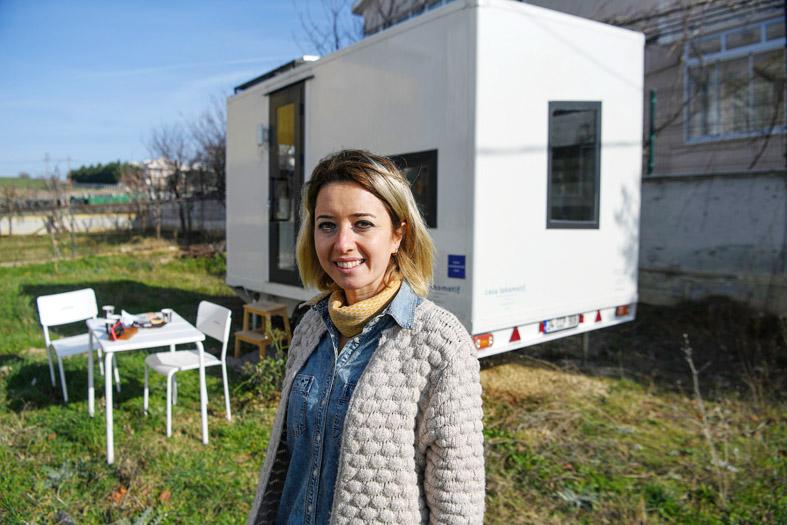Gizem Baburhan stepped into a tiny house on wheels she rented in the Aegean vineyards and saw the future of Turkey’s COVID-19-ravaged tourism industry.
“This minimalist life offered us priceless peace,” Baburhan said. “I hope in the future, we will own a tiny house and tour the world with a home on our backs.”
The tiny house movement — a fad that gained momentum in the US in the wake of the 2008 global financial crisis — appears to have caught on in Turkey during the COVID-19 pandemic.

Photo: AFP
The unimposing wood and composite metal structures resemble spruced-up sheds on wheels or sawn-off trailer homes.
Yet the Turkish firms that make them say they have barely been able to keep up with demand in the past year.
YAKO Groups chief executive Galip Olmez said that he received only “sporadic orders” after introducing the idea to Turkey in 2017.

Photo: AFP
“If we compare 2020 with the previous year, the orders have increased 20-fold,” Olmez said without disclosing precise numbers.
Architect Pelin Dustegor said that most of her Casa Lokomotif tiny house company’s clients were “from the tourism industry looking for camping concepts.”
“We had just under 250 orders in all of 2019 and this shot up to 4,500 a month in 2020,” Dustegor said. “There has been tremendous interest.”
Turkey is perhaps best known to global tourists as the place of golden beaches and all-inclusive luxury hotels, but the economic shock of the pandemic and suspicions that people could shy away from crowds for years to come have some Turkish tourism firms revising their plans.
Dustegor said that the tiny houses’ popularity with tourism firms is rooted in their low investment cost and the potential to turn a profit within three-and-a-half years.
The houses can also be parked on land without a building permit because they have the status of a vehicle in Turkey.
People between their late 30s and early 40s also tend to buy them as an investment and then rent them out, Dustegor said.
Caglar Gokgun rents out the tiny house he bought and parked in the middle of a vineyard on the Aegean Sea.
“People will want to stay in nature in small groups rather than at a 500-person hotel,” Gokgun said. “No one will want to wait in line for an open buffet.”
Baburhan said that the New Year holiday she spent with her husband at Gokgun’s vineyard home was like being in Alice’s Adventures in Wonderland.
“We didn’t know what to expect at first, but we found ourselves in a tiny, fully fledged house in the heart of a wonderful vineyard. We quickly got used to the house and felt like we have been living there for years,” she said.
Olmez said that his firm produces homes ranging from 15m2 40m2 — about the size of a small studio or a hotel room.
Their prices range from US$17,000 to US$30,000. It is hard to buy a small house in Istanbul for less than US$70,000.
Clients who want to put down a tiny house on land they already own are responsible for hooking up the water and electricity, while the firm builds the home, and takes care of the furnishings and design.
“We see tiny houses as the future of tourism in Turkey,” Olmez said in his tiny house showroom on the outskirts of Istanbul.
Olmez said that a year of lockdowns has prompted many to reassess the benefit of spending time in concrete apartment blocks.
“Humanity has begun to return to its roots,” said Olmez, as two young women checked out a cabin on wheels in his showroom. “People should not be scared of minimalism. It does not shrink life, but liberates it.”

POLITICAL PRISONERS VS DEPORTEES: Venezuela’s prosecutor’s office slammed the call by El Salvador’s leader, accusing him of crimes against humanity Salvadoran President Nayib Bukele on Sunday proposed carrying out a prisoner swap with Venezuela, suggesting he would exchange Venezuelan deportees from the US his government has kept imprisoned for what he called “political prisoners” in Venezuela. In a post on X, directed at Venezuelan President Nicolas Maduro, Bukele listed off a number of family members of high-level opposition figures in Venezuela, journalists and activists detained during the South American government’s electoral crackdown last year. “The only reason they are imprisoned is for having opposed you and your electoral fraud,” he wrote to Maduro. “However, I want to propose a humanitarian agreement that

ECONOMIC WORRIES: The ruling PAP faces voters amid concerns that the city-state faces the possibility of a recession and job losses amid Washington’s tariffs Singapore yesterday finalized contestants for its general election on Saturday next week, with the ruling People’s Action Party (PAP) fielding 32 new candidates in the biggest refresh of the party that has ruled the city-state since independence in 1965. The move follows a pledge by Singaporean Prime Minister Lawrence Wong (黃循財), who took office last year and assumed the PAP leadership, to “bring in new blood, new ideas and new energy” to steer the country of 6 million people. His latest shake-up beats that of predecessors Lee Hsien Loong (李顯龍) and Goh Chok Tong (吳作棟), who replaced 24 and 11 politicians respectively

Young women standing idly around a park in Tokyo’s west suggest that a giant statue of Godzilla is not the only attraction for a record number of foreign tourists. Their faces lit by the cold glow of their phones, the women lining Okubo Park are evidence that sex tourism has developed as a dark flipside to the bustling Kabukicho nightlife district. Increasing numbers of foreign men are flocking to the area after seeing videos on social media. One of the women said that the area near Kabukicho, where Godzilla rumbles and belches smoke atop a cinema, has become a “real

‘WATER WARFARE’: A Pakistani official called India’s suspension of a 65-year-old treaty on the sharing of waters from the Indus River ‘a cowardly, illegal move’ Pakistan yesterday canceled visas for Indian nationals, closed its airspace for all Indian-owned or operated airlines, and suspended all trade with India, including to and from any third country. The retaliatory measures follow India’s decision to suspend visas for Pakistani nationals in the aftermath of a deadly attack by shooters in Kashmir that killed 26 people, mostly tourists. The rare attack on civilians shocked and outraged India and prompted calls for action against their country’s archenemy, Pakistan. New Delhi did not publicly produce evidence connecting the attack to its neighbor, but said it had “cross-border” links to Pakistan. Pakistan denied any connection to